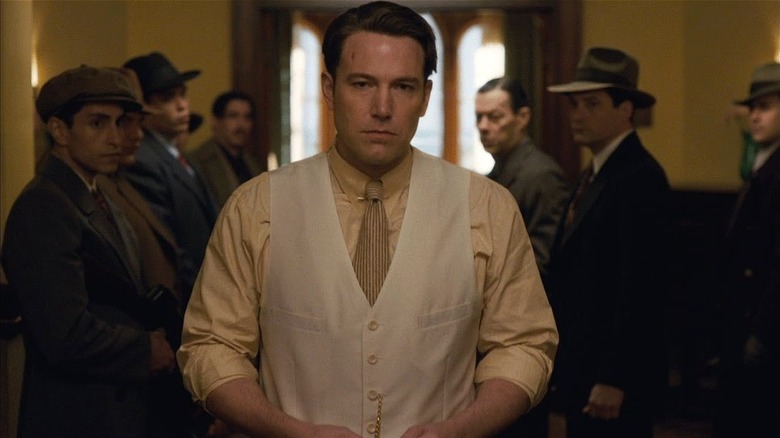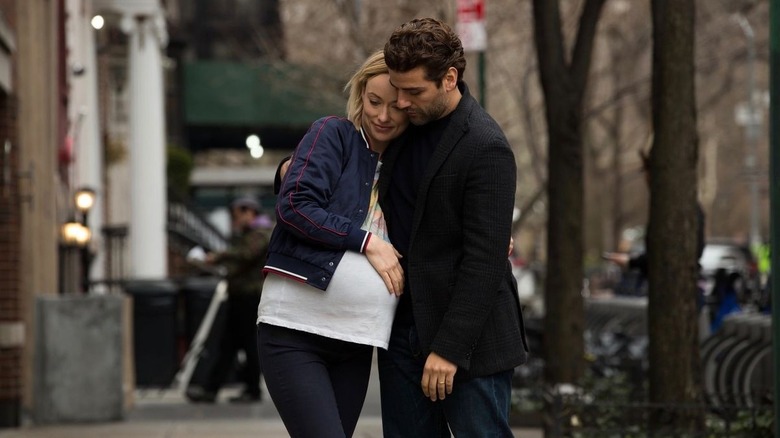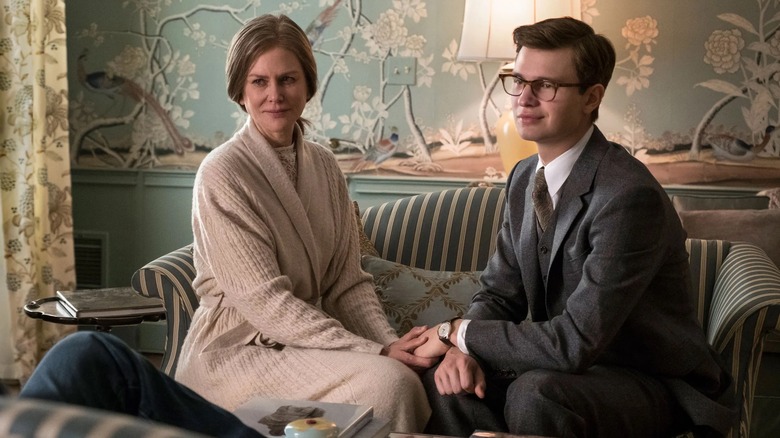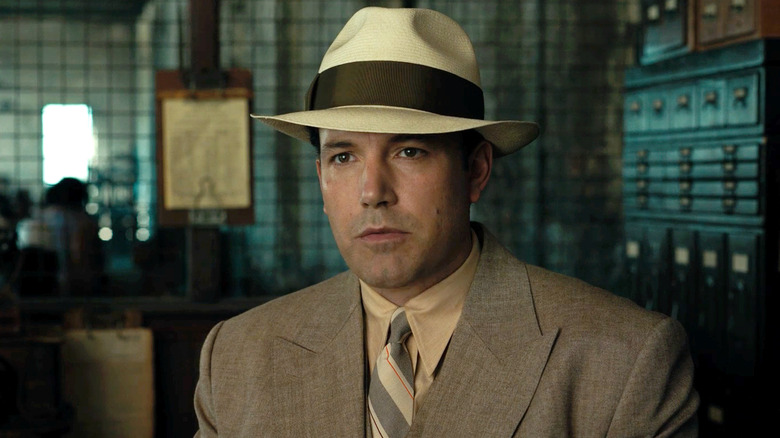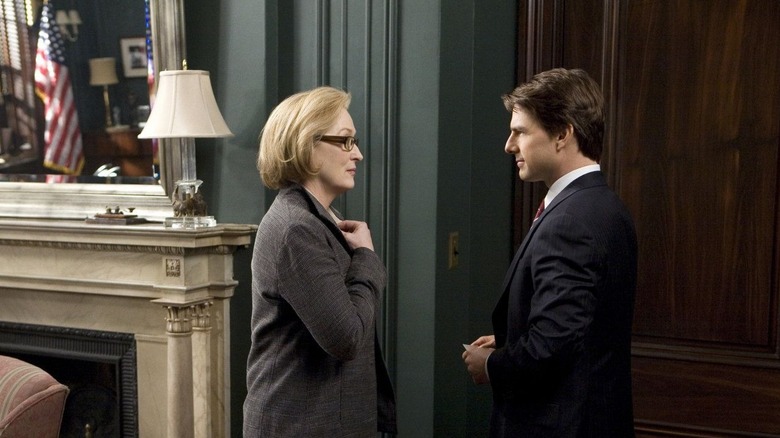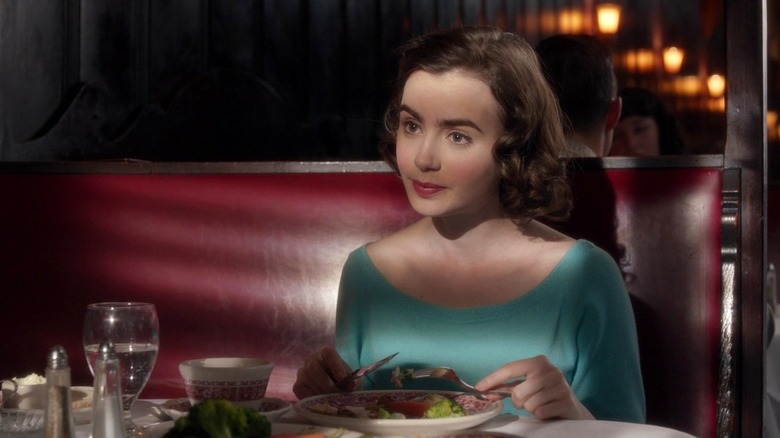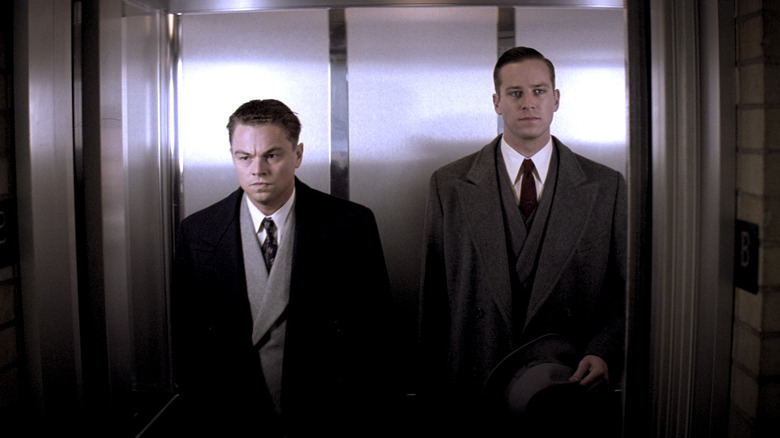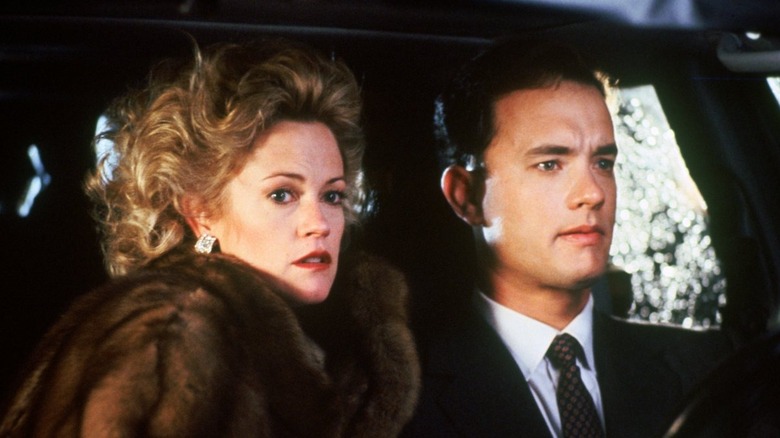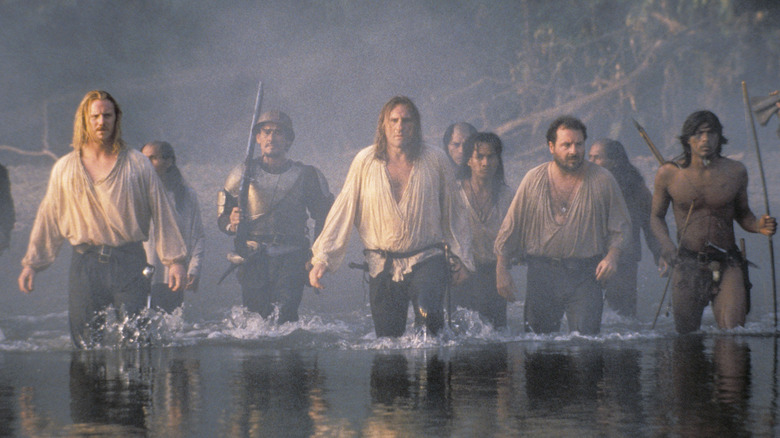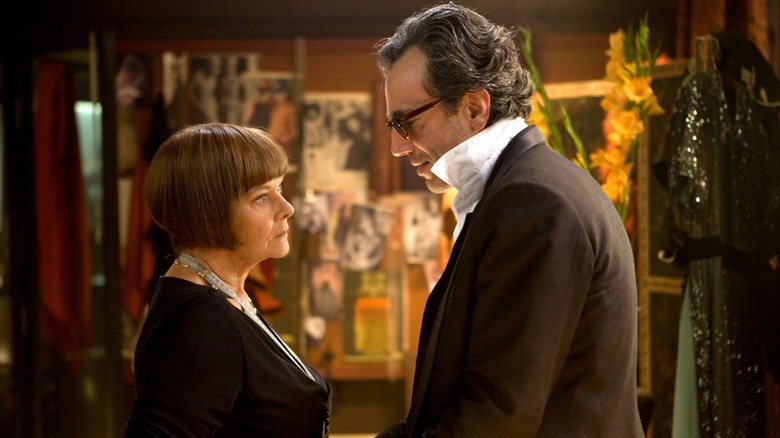10 Award-Season Movies That Got Absolutely Trashed By Critics
When September rolls around and some of the big film festivals get underway, you know award season has begun. Until December, movie studios of all sizes release their best features, hoping they have a shot at Oscar glory. 2025 has already been a rough time for some contenders. Projects like "Ammonite" and "After the Hunt" haven't earned their hype, and the season's big biopic, "Springsteen: Deliver Me From Nowhere," is perplexingly bad. These movies likely won't become award-winning darlings.
They're not alone. If there is any comfort for the crew of those films, it's that their critical reception has been nowhere as toxic as some of the most detested award-bait movies released over the years. We're going to discuss 10 award-season features that had such notorious critical receptions that they're still held up as examples of cinematic art gone awry — stabs at prestige filmmaking that devolved into dreck. Their flaws vary greatly depending on the intent of each individual film. What binds all of these projects is shoddy craftsmanship that left everything on the table. These productions prove that launching in award season isn't enough to automatically lend your project those fancy laurels.
Life Itself
In December 2017, Amazon Studios plunked down $10+ million for the U.S. distribution rights to "Life Itself," a star-studded movie chronicling a series of lives that are unexpectedly connected. The clear hope here was that writer/director Dan Fogelman would replicate the success he'd had with the similarly-themed NBC program "This Is Us" on the big screen. There were also clear hopes that "Life Itself" would become an Oscar juggernaut in the same way that the series became a staple at Emmy ceremonies.
Not only did "Life Itself" fail to measure up to "This Is Us" (a fate possibly foreshadowed by how fans reacted to the nonsense reveal about Randall's birth mother), Fogelman's first film earned scathing reviews. Critics called it a bunch of treacly nonsense, among other takedowns aimed at its smarmy emotive bloat. On Metacritic, only four movies scored worse reviews that year, a testament to how poorly this feature landed. Among the flaws critics hit on was a heavy emphasis on narration and monologues, all of which blurred together. Flatly-written characters and comically excessive time jumps were also a target of repeated criticism.
No award nominations (beyond two nods in local Worst Film of the Year categories) would be granted to the film. Despite Amazon spending a bundle on it, "Life Itself" was dead on arrival.
The Goldfinch
Six years after Donna Tartt's novel "The Goldfinch" hit bookshelves, a film adaptation from director John Crowley reached movie theaters. The production's cast included Ansel Elgort, Finn Wolfhard, Sarah Paulson, Jeffrey Wright, and Nicole Kidman, plus cinematography from the legendary Roger Deakins (whose artistry didn't merely uplift "Sicario," but ensured Josh Brolin showed up). Given that Crowley's previous film, "Brooklyn," had turned into an Oscar darling, there were high hopes behind "The Goldfinch."
Instead, "The Goldfinch" was greeted with a tepid critical reception; one that typically reserved any praise for Deakins' powerfully framed imagery. The biggest shortcoming of the movie (which follows the life of a young boy after his mother dies in a terrorist attack) was how it felt like a 149-minute-long montage. "The Goldfinch" lacked either a tangible humanity between its characters, or important connective tissue across scenes. As a result, its "sweeping" emotional scenes rang hollow, leaving viewers cold. The subpar pacing, dismal editing, and an inert central performance from Elgort also came under fire.
Even the score was lambasted by critics. Thanks to the heated collective judgment, the film quickly vanished from public consciousness, which ensured that it would have no presence in the year's award season. Like other awful adaptations over the years, "The Goldfinch" was better left as a novel.
Live By Night
Where do you go after your movie wins the Academy Award for best picture? It's a dilemma only a handful of filmmakers have navigated. While some (like Guillermo del Toro) scored more nominations after their big win, others found their next films falling short of expectations. Kevin Costner's "Dances with Wolves," for instance, was followed up by the science fiction disaster "The Postman." John Madden (not the football coach) made the critically panned "Captain Corelli's Mandolin" his next project after sweeping statues into his arms with "Shakespeare in Love."
Unfortunately, Ben Affleck followed in the footsteps of the wrong guys by following up "Argo" with the forgettable "Live By Night." The gangster period drama (which also starred Affleck) was one of the last films to debut in the 2016-2017 award season race, thanks to a last-minute premiere on December 13, 2016.
Negative reviews were quick to pour in, making it clear that "Live By Night" would not score Affleck any favors, much less any awards. The biggest recurring complaint was how lifeless the film felt. Despite wearing three hats during production as star, director, and writer, Ben Affleck couldn't pull the look together.
Lions for Lambs
Chaos, uncertainty, and cynicism gripped America during the Iraq War, and there was little clarity to be found. Screenwriter Matthew Michael Carnahan and director Robert Redford hoped to take on the themes of those troubled times with the 2007 film "Lions for Lambs." The project (which starred Redford, Tom Cruise, and Meryl Streep) followed multiple storylines placed among the different stratospheres of American society. It ranged from a U.S. senator's chambers to the front lines of war. All of these settings were intertwined with the conflict in the Middle East.
Redford lent intimate insight into the fall of a crumbling family in the Oscar-winning "Ordinary People" 27 years earlier. If he had offered a similar depth to the issues explored in "Lions for Lambs," the feature could have been a triumph. Instead, "Lions for Lambs" was critically trashed. Roger Ebert lamented how the film was a non-stop dialogue that never took viewers to interesting places. Other critics were frustrated that the project didn't work as commentary on the relevant politics, much less as an engaging piece of cinema.
After a rush of unhappy reviews, "Lions for Lambs" managed zero Oscar nominations. Not even award-season darling Meryl Streep got "Lambs" onto the radar. Instead, it is her lowest-rated and most forgettable film. In a tumultuous era, "Lions for Lambs" only provided more noise.
Welcome to Marwen
The excellent 2010 documentary "Marwencol" follows Mark Hogancamp, a man who experienced severe brain damage and memory loss after becoming the victim of a hate crime. As part of his recovery, he finds solace in building and photographing World War II-themed scenes, where dolls stand in for himself and the people in his life. Intimate camerawork frames Hogancamp's coping process with transfixing imagery. Unfortunately, Hollywood would transform this project into a mainstream feature titled "Welcome to Marwen," with Steve Carell playing Hogancamp. Director Robert Zemeckis brought his obsession for digital effects along, which made Hogancamp's photographic fantasies into elaborate yet bland action sequences rife with uncanny CGI.
"Marwencol" offered a personal ambiance with its subject, not to mention an honest and sensitive discussion of Hogancamp's cross-dressing. Almost all of that was exchanged for mainstream slop in Zemeckis' version, even if it managed to not fumble Hogancamp's preference for women's wear. It didn't highlight that fact in marketing, either, continuing a tradition of shaming or silencing queer lives.
Even for those unaware of the documentary, "Welcome to Marwen" was a disaster immortalized by its abysmal critical reception. The misguided emphasis on spectacle, a miscast Carell, and a badly placed homage to an earlier Zemeckis film, "Back to the Future," were all highlighted among its multiple additional issues. Years after its release, "Marwencol" remains a must-see documentary. In contrast, time hasn't softened the reputation of "Welcome to Marwen."
Rules Don't Apply
In November 2016, Warren Beatty finally released his first directorial effort since 1998's "Bulworth," a generic thing called "Rules Don't Apply." During his career, Beatty has procured 14 Oscar nominations across several categories, including best picture, best director, best actor, and best original screenplay. All four of his previous directorial efforts had garnered high-profile attention. Expectations were high that "Rules Don't Apply" could soar similarly high during its award season.
Unfortunately, this flick about Howard Hughes (Beatty) drew a slate of reviews ranging from mixed to outright negative. While most lauded the film's leading lady, Lily Collins, "Rules Don't Apply" was greeted with a shrug courtesy of limp filmmaking and a deeply monotonous atmosphere. Previous Beatty works like "Bulworth" inspired pronounced reactions in all directions. "Rules Don't Apply," meanwhile, was deemed forgettable by critics. A lengthy wait for Beatty's newest effort had resulted in something generic.
Save for Collins earning her best actress Golden Globe nomination, and the film collecting a handful of best original song nods at smaller ceremonies, "Rules Don't Apply" was nonexistent. The Oscars bestowed zero nominations on the picture, a drastic downturn for Beatty's usually celebrated appearances. Like the awful "Town & Country," it's a film that almost ruined Beatty's reputation.
J. Edgar
2011's "J. Edgar" sure seemed to have all the ingredients necessary to guarantee a critical darling. After all, this was a project uniting director Clint Eastwood with star Leonardo DiCaprio in a biopic about the life of J. Edgar Hoover. Not every Eastwood movie is beloved, but many are, and combining him with DiCaprio suggested real potential. In execution and quality, unfortunately, "J. Edgar" would be closer to DiCaprio's "The Quick and the Dead" than "The Revenant."
Critics were not a fan of this so-dry-it's-parched flick, especially when it came to its conventional story structure and cold visual scheme. DiCaprio's performance was universally lauded, but several critics lamented how his livelier work in the film highlighted the way the rest of the film lacked a pulse.
Dustin Lance Black's screenplay, meanwhile, was raked over the coals for handing out awful dialogue, while the film's poor use of old age makeup went mocked. Any hopes that this production would echo the rave reviews earned by past Eastwood films like "Unforgiven" went up in smoke. "J. Edgar" scored zero Oscar nominations — inevitable, given its quickly drowning reputation. Combining Eastwood and DiCaprio's respective artistic might wasn't enough to save this thing from the critical drubbing it deserved.
The Bonfire of the Vanities
Decades after its release, Brian De Palma's "The Bonfires of the Vanities" (a film adaptation of the 1987 Tom Wolfe novel of the same name) is synonymous with big-budget movies gone awry. A feature based on such beloved source material starring Tom Hanks, Melanie Griffith, and Morgan Freeman, should have been a slam-dunk. Instead, "Bonfire of the Vanities" landed with a thud in its theatrical debut. Critics savaged it to the bone, ensuring it would become a punchline for the rest of the decade.
Some reviews highlighted the disparity between Wolfe's transgressive novel and its too-safe film adaptation. What riveted readers a few years earlier for its boldness now left moviegoers puzzled with its softness. Others focused on their grievances with its underwhelming performances. Universally, everyone skewered attempts at comedy scattered like caltrops throughout the movie. Bad comedies are an extra-uncomfortable strain of cinema to sit through and "Vanities" was no exception, despite the best efforts of Tom Hanks. In his defense, both he and co-star Bruce Willis openly wished they'd never made this '90s flop.
Ages after its debut, the abysmal reputation surrounding this project hasn't faded. If anything, the quality of Hanks' future work — among other cast survivors — only amplified every still-valid criticism of "Bonfire of the Vanities."
1492: Conquest of Paradise
Director Ridley Scott retains a legendary reputation. Nobody can stop the man who gave us classics like "Alien," "The Last Duel," "The Martian," and "Blade Runner." That said, it is remarkable how many critical duds Scott has also helmed. Like "Robin Hood" and "Exodus: Gods and Kings," there are plenty of Scott features out there that don't live up to the hype. His commitment to constant work, often delivering new titles on an annual basis, has ensured there are no guarantees. One of his worst-reviewed movies is his 1992 epic "1492: Conquest of Paradise," which saw Gérard Depardieu — now best known as a sex pest nobody likes working with – playing Christopher Columbus.
Even though it reunited Scott with "Alien" lead Sigourney Weaver, "Conquest of Paradise" was universally derided for being an intolerable slog. Neither Roselyne Bosch's screenplay nor Scott's filmmaking found any compelling drama to explore in Columbus' problematic saga during the film's bloated 156-minute runtime. Critics bemoaned how little our titular explorer actually explored, literally and metaphorically.
The film's historical inaccuracies, in particular its depiction of Columbus having any sort of gentle relationship with America's indigenous population, were also a deep well of accurate criticism. Ridley Scott has made many all-time gems. "1492: Conquest of Paradise" isn't even a lump of talc.
Nine
If any movie was tailor-made for the award season, it was 2009's "Nine." The Weinstein Company leadership clearly hoped to replicate the success of "Chicago" (which was made at Harvey Weinstein's first studio, Miramax) by bringing back director Rob Marshall for a new star-studded musical, "Nine." Daniel Day-Lewis would star and a slew of ladies like Marion Cotillard, Penélope Cruz, and Fergie were going to be analogous to the star-studded backdrop "Chicago" excelled with. Marshall later said that The Weinstein Company's insistence on marketing the artsier "Nine" as a mainstream project hurt the film creatively and financially.
Any hopes that "Nine" would be "Chicago 2.0" quickly went up in flames. Though it received a quartet of Oscar nominations (including a best supporting actress nod), "Nine" secured predominantly negative reviews for feeling emotionally inert. While other musicals wore their hearts on their sleeves, Marshall's "Nine" was criticized for having a hollow soul. Uninspired musical numbers, impenetrable narrative, and erratically successful performances were further sore points. If the members of this unhappy club prove anything, it's that there really is such a thing as trying too hard for that award season glory.
